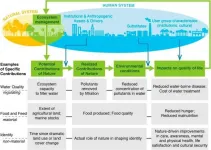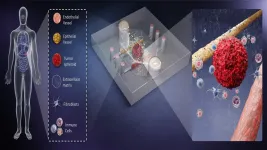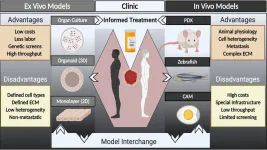INFORMATION:
Roach acknowledged funding support for the research from the Ewing Marion Kauffman Foundation Junior Faculty Fellowship, and Skrentny from the Alfred P. Sloan Foundation and National Science Foundation.
For additional information, see this Cornell Chronicle story.
Rethink immigration policy for STEM doctorates
2021-01-21
(Press-News.org) ITHACA, N.Y. - A streamlined process for awarding green cards to international STEM doctoral students graduating from U.S. universities could benefit American innovation and competitiveness, including leveling the field for startups eager to attract such highly skilled workers, according to a new study by researchers from Cornell University and the University of California, San Diego.
The new Biden administration backs policy reform aimed at achieving that end, which was part of bipartisan legislation proposed more than a decade ago. But progress has been stalled by broader concerns about visas - particularly the temporary H-1B, commonly used to hire entry-level guest IT workers - that critics say displace Americans with lower-paid foreign labor and should be scaled back.
The new study presents evidence that the same concerns shouldn't apply to foreign-born STEM doctorates from U.S. universities, said Michael Roach, assistant professor in the Charles H. Dyson School of Applied Economics and Management, in the Cornell SC Johnson College of Business.
"Given that these doctorates often possess highly specialized skills and training at the leading edge of research in areas like vaccines, artificial intelligence, robotics and space," Roach said, "blanket visa restrictions could significantly impact U.S. firms' ability to hire and retain the best and brightest scientists."
Roach is the co-author with John Skrentny, professor of sociology at UC San Diego, of "Rethinking Immigration Polices for STEM Doctorates," to be published Jan. 22 in the journal Science.
The scholars surveyed a cohort of nearly 1,600 American and foreign-born STEM doctorates from U.S. research universities about their first industry research and development jobs, including their qualifications, starting salaries, hours worked and visa paths, where applicable.
The researchers found a majority of the international doctorates followed a complex and inefficient path toward permanent residency that involved multiple steps and visas. After their student visa, two-thirds were sponsored in their first job for an H-1B guest worker visa, which are offered annually by lottery, valid for three years and renewable for three more.
The percentages were highest among STEM doctorates from India and China - 78% and 67%, respectively - who because of per-country quotas face waits for green cards of as long as five to 10 years.
Employers didn't use the temporary H-1B visas as a means to give employees extended trial periods, Roach and Skrentny found. Rather, they appeared to be used to buy time between graduation - and working on their student visa through the Optional Practical Training (OPT) program - and a green card, with employers transitioning within two or three years, on average, to sponsorships for permanent residency.
According to the researchers, doctorates pass through the H-1B on their way to a green card not because it is legally required, but rather because delays and uncertainties in the U.S. visa system necessitate this step as a bridge to working in the U.S. permanently.
Those delays and uncertainties have given Big Tech firms such as Amazon, Google and Microsoft a recruiting advantage over startups, for whom sponsoring foreign-born STEM doctorates may be too costly or burdensome. In addition, the study noted, leading U.S. firms have opened R&D centers in countries with immigration policies designed to attract highly skilled workers, such as Canada.
"Rather than rolling out a red carpet for these doctorates, the visa system necessitates a wait at a crowded front door, and multiple steps, with no guarantee they can get in," said Skrentny. "These individuals have rare and valuable skills, and they can get jobs in almost any country."
In previous research, Roach and Skrentny found that international STEM doctorates from U.S. universities were more interested than their American counterparts in working for startups, but less than half as likely to accept startup job offers, largely due to visa concerns.
A relatively simple solution, the researchers said - as proposed in the Stopping Trained in American Ph.D.s from Leaving the Economy (STAPLE) Act in 2009, and again now by the Biden administration - would be to give foreign-born STEM doctorates green cards upon graduation through existing employment-based visa categories while also exempting them from national caps.
Roach and Skrentny found a highly competitive market for STEM doctorates, who, according to data from the U.S. Bureau of Labor Statistics, had a pre-COVID 19 unemployment rate of roughly 1% and a median annual salary of $100,000. The researchers found in their own survey data that American and foreign-born doctorates reported no significant differences in compensation or hours worked early in their industry R&D careers, suggesting that U.S. workers were not being negatively impacted and foreign workers weren't being exploited - two significant concerns relating to H-1B visas.
Such detailed data about the visa paths of U.S. university STEM doctorates hasn't previously been available to inform policymakers, the researchers said. They said the data suggests immigration policy should treat STEM doctorates from U.S. universities differently, given their relatively small numbers - roughly 3,000 to 5,000 per year - but disproportionate contributions to innovation.
"We provide new evidence that, we think, dispels many of the concerns that have hindered past efforts at visa reforms for high-skilled workers," Roach said. "We are optimistic that this study might provide much needed evidence in support of visa changes.
ELSE PRESS RELEASES FROM THIS DATE:
A closer look at T cells reveals big differences in mild vs. severe COVID-19 cases
2021-01-21
LA JOLLA, CA--A big question on people's minds these days: how long does immunity to SARS-CoV-2 last following infection?
Now a research team from La Jolla Institute for Immunology (LJI), The University of Liverpool and the University of Southampton has uncovered an interesting clue. Their new study suggests that people with severe COVID-19 cases may be left with more of the protective "memory" T cells needed to fight reinfection.
"The data from this study suggest people with severe COVID-19 cases may have stronger long-term immunity," says study co-leader LJI Professor Pandurangan Vijayanand, M.D., Ph.D.
The research, published Jan. 21 in Science Immunology, is the first to describe the T cells that fight SARS-CoV-2 in "high resolution" ...
Age-based COVID-19 vaccine strategy that saves most lives prioritizes elderly, modeling shows
2021-01-21
Vaccinating people over 60 is the most effective way to mitigate mortality from COVID-19, a new age-based modeling study suggests. Although vaccination of younger adults is projected to avert the greatest incidence of disease, vaccinating older adults will most effectively reduce deaths, the analysis shows. Less than one year after SARS-CoV-2 was identified, deployment of multiple vaccines against the virus has been initiated in several countries. Although vaccine production is being rapidly scaled up, demand will exceed supply for the next several months. An urgent challenge is the optimization of vaccine allocation to maximize public health benefit. To quantify the impact of COVID-19 vaccine ...
Why older adults must go to the front of the vaccine line
2021-01-21
Vaccinating older adults for COVID-19 first will save substantially more U.S. lives than prioritizing other age groups, and the slower the vaccine rollout and more widespread the virus, the more critical it is to bring them to the front of the line.
That's one key takeaway from a new University of Colorado Boulder paper, published today in the journal Science, which uses mathematical modeling to make projections about how different distribution strategies would play out in countries around the globe.
The research has already informed policy recommendations by the Centers for Disease ...
The downward trend: Nature's decline risks our quality of life
2021-01-21
It is no secret that over the last few decades, humans have changed nature at an ever-increasing rate. A growing collection of research covers the many ways this is impacting our quality of life, from air quality to nutrition and income. To better understand how which areas are most at risk, scientists have combed through volumes of literature to present global trends in the relationship between human wellbeing and environmental degradation.
Their work, which included Fabrice DeClerck from the Alliance of Bioversity International and CIAT, was summarized in "Global trends in nature's contributions to people", which was recently published in Proceedings of the National Academy of Sciences.
This systematic ...
Combining best of both worlds for cancer modeling
2021-01-21
WASHINGTON, January 21, 2021 -- Despite cancer being a leading cause of death worldwide, treatment options for many types of cancers remain limited. This is partly due to the in vitro tools used to model cancers, which cannot adequately predict the behavior of a cancer or its sensitivity to drugs.
Further, animal models, like mice, biologically differ from humans in ways that play a critical role in immunotherapy, and results from animal studies do not always translate well to human disease.
These shortcomings point to a clear need for a better, patient-specific model to improve the understanding of cancer cells and their impacts.
Researchers from the University of Wisconsin and the University ...
Medicated drops may help close macular holes, helping some patients avoid surgery
2021-01-21
Medicated drops may help close small macular holes over a two- to eight-week period, allowing some people to avoid surgery to fix the vision problem, a new study suggests.
The findings, based on a retrospective multicenter case series published Dec. 15, 2020, in Ophthalmology Retina, could lead to a better understanding of which patients may benefit from the treatment, as well as the timeline of the treatment's effectiveness.
"For certain patients, medicated drops may heal their macular hole by decreasing inflammation and increasing fluid absorption in the retina," said ophthalmologist and retinal surgeon Dimitra Skondra, MD, PhD, senior author of the study. Skondra is an associate professor of ophthalmology and visual ...
Personalizing cancer care with improved tumor models
2021-01-21
WASHINGTON, January 21, 2021 -- Cancer is a major, worldwide challenge, and its impact is projected to escalate due to aging and growth of the population. Researchers recognize that new approaches to diagnose and treat deadly cancers, including identifying new drugs to treat cancer, will be essential to curbing the growing impact of the disease.
While decades of investment in research have resulted in substantial improvements in surviving cancer, a key challenge remains in identifying new drugs that improve outcomes for cancer patients, particularly for cancers when tumors have spread throughout the body.
In APL Bioengineering, by AIP Publishing, researchers suggest a major hurdle to identifying new drugs is the paucity of models -- organisms ...
Study finds bilateral agreements help developing economies spur foreign investment
2021-01-21
EUGENE, Ore. -- Jan. 21, 2021 -- Developing economies suffer from a paradox: they don't receive investment flows from developed economies because they lack stability and high-quality financial and lawmaking institutions, but they can't develop those institutions without foreign funds.
A study co-authored by Brandon Julio, a professor in the Department of Finance at the University of Oregon's Lundquist College of Business, found that bilateral investment treaties, commonly known as BITs, can help developing economies overcome this paradox, but only as long as those ...
Study finds genetic clues to pneumonia risk and COVID-19 disparities
2021-01-21
Researchers at Vanderbilt University Medical Center and colleagues have identified genetic factors that increase the risk for developing pneumonia and its severe, life-threatening consequences.
Their findings, published recently in the American Journal of Human Genetics, may aid efforts to identify patients with COVID-19 at greatest risk for pneumonia, and enable earlier interventions to prevent severe illness and death.
Despite the increasing availability of COVID-19 vaccines, it will take months to inoculate enough people to bring the pandemic under control, experts predict. In the meantime, thousands of Americans are hospitalized and die from COVID-19 each ...
How to get more electric cars on the road
2021-01-21
A new study from researchers at MIT uncovers the kinds of infrastructure improvements that would make the biggest difference in increasing the number of electric cars on the road, a key step toward reducing greenhouse gas emissions from transportation.
The researchers found that installing charging stations on residential streets, rather than just in central locations such as shopping malls, could have an outsized benefit. They also found that adding on high-speed charging stations along highways and making supplementary vehicles more easily available to people who need to travel beyond the single-charge range of their electric vehicles could greatly increase the vehicle electrification potential.
The findings are reported today in the journal Nature Energy, in a paper by MIT associate ...




